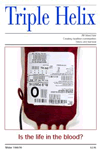This is a challenging read, highlighting some of the blind spots of social policy and their consequences. It points out that 'if any Chief Medical Officer had recommended a drug for preventing pneumonia and after 10 years the result had been to increase the prevalence of the disease, the policy would have been rapidly abandoned'. However, there has been no recognition that since prescribing contraceptives for teenagers there has been an increase in teenage pregnancies, sexually transmitted diseases and later in carcinoma of the cervix. There is pressure to extend this policy.
In the nineteenth century poor children were sexually abused as prostitutes until the Salvation Army and others campaigned to outlaw this evil, and made it illegal to have sex with a child under 16. Are we going backwards? There is an 'almost schizophrenic attitude' on the part of authorities, treating paedophilia very severely whilst subsidising sexual activity in those as young as 12. When girls have sex they are generally looking for love, whereas boys crave excitement. Sex without lasting relationship inevitably leads to anticlimax. Teenagers are not good at lasting relationships and so become disillusioned.
We know the effects of tobacco on health; hence the TV heroes and heroines do not smoke. Yet despite all the evidence, these role models are often in bed together on an early date. It seems ironic that the feminist lobby, so keen to give women 'the right to choose' has, by increasing the volume on the 'everybody's doing it' message, effectively made it a lot more difficult for young women to choose to say 'no'!
This booklet cuts through political correctness most refreshingly, and challenges us to action. My only disagreement was with what I felt to be an overstatement of some problems associated with the use of the oral contraceptive pill.
Reviewed by
Maggy Spence
(GP, Essex)































